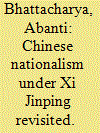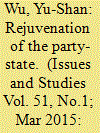| Srl | Item |
| 1 |
ID:
167317


|
|
|
|
|
| Summary/Abstract |
In China, nationalism that took root in the era of globalization under the third-generation leadership of Jiang Zemin is principally meant to address the internal threats challenging party legitimacy and stability and not to resist the foreign enemies, as was the goal in the twentieth century. This is because internal stability is considered prerequisite to harness the potentials of globalization. Paradoxically therefore, nationalism and globalization, that are antithetical forces, go hand in hand in China. Under the current leadership, both the forces of nationalism and globalization are underscored in Xi Jinping’s dream project- the Belt and Road Initiative (BRI). Notably, the success of BRI is contingent on the persistence of globalization externally. But the rising trends of de-globalization in the West do not augur well for the BRI that has been envisaged to not only meet the demands of a slowing economy but to expand China’s global footprints, and thereby, fulfil the China Dream. Therefore, a sense of insecurity pervades Chinese nationalism. This ‘insecure’ nationalism under Xi Jinping is engendering a belligerent turn to Chinese foreign policy.
|
|
|
|
|
|
|
|
|
|
|
|
|
|
|
|
| 2 |
ID:
138153


|
|
|
|
|
| Summary/Abstract |
It is widely recognized that the political system in the PRC is more institutionalized and predictable than in the past, and that its regular rejuvenation is a source of strength. While not denying the virtues of the age-based system, this paper argues that there are limits on the forced rejuvenation scheme. It looks at how cadres on the CCP’s Central Committee are excluded from competing for the top leadership positions because of their age. Four groups of elite are identified, T2 (zongshuji, zongli), SCP-T2 (changwei), PB-SCP (juwei), and CC-PB (zhongwei), and their frustration over exclusion from competing for the T2 positions in the next major leadership turnover (next even-numbered Party Congress) measured (Exclusion and Frustration Rate, EFR). An overall score is also calculated to measure the total frustration with the system (Total Exclusion and Frustration, TEF). It is shown that the EFR and TEF are extremely high, and tension is bound to accumulate in the system. Finally, the Bo Xilai (薄熙來) case is explored to demonstrate how aspiring cadres may be discriminated against by the system and thus inclined to rebel against it. It is advised that instead of simply accepting the system as it stands and calculating how personnel decisions will be churned out, more attention should be given to its limits and sustainability in the long term.
|
|
|
|
|
|
|
|
|
|
|
|
|
|
|
|